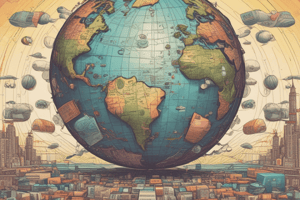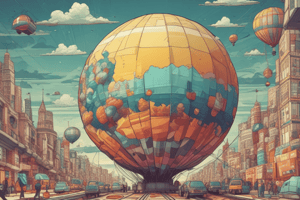Podcast
Questions and Answers
What is inflation?
What is inflation?
- A sudden change in the price level of goods and services in an economy
- A sustained increase in the general price level of goods and services in an economy (correct)
- A sustained decrease in the general price level of goods and services in an economy
- A stable price level of goods and services in an economy
What is a cause of demand-pull inflation?
What is a cause of demand-pull inflation?
- Decrease in aggregate demand
- Excessive demand for goods and services (correct)
- Improvement in productivity
- Increase in production costs
What is a measure of inflation?
What is a measure of inflation?
- Interest Rate
- Consumer Price Index (CPI) (correct)
- Unemployment Rate
- GDP Deflator
What is an effect of inflation?
What is an effect of inflation?
What is deflation?
What is deflation?
What is a cause of deflation?
What is a cause of deflation?
What is an effect of deflation?
What is an effect of deflation?
What is not an effect of inflation?
What is not an effect of inflation?
Flashcards are hidden until you start studying
Study Notes
Inflation
- Definition: A sustained increase in the general price level of goods and services in an economy over a period of time.
- Causes:
- Demand-pull inflation: Excessive demand for goods and services drives up prices.
- Cost-push inflation: Increase in production costs, such as raw materials or labor, leads to higher prices.
- Monetary policy: Excessive money supply or low interest rates can lead to inflation.
- Supply chain disruptions: Shortages or bottlenecks in supply chains can drive up prices.
- Effects:
- Reduces purchasing power: Inflation erodes the value of money, making it harder for individuals to afford goods and services.
- Uncertainty: Inflation can make it difficult for businesses and individuals to predict future costs and revenues.
- Inequality: Inflation can benefit borrowers at the expense of savers, and can disproportionately affect certain groups, such as fixed-income earners.
- Measures:
- Consumer Price Index (CPI): Tracks changes in the average price of a basket of goods and services.
- GDP Deflator: Measures the average price of all goods and services produced within an economy.
Deflation
- Definition: A sustained decrease in the general price level of goods and services in an economy over a period of time.
- Causes:
- Decrease in aggregate demand: Reduced spending and investment lead to lower prices.
- Increase in productivity: Improved production efficiency can lead to lower prices.
- Monetary policy: Tight monetary policy, such as high interest rates, can reduce money supply and lead to deflation.
- Globalization: Increased global competition can lead to lower prices.
- Effects:
- Increased purchasing power: Deflation increases the value of money, making it easier for individuals to afford goods and services.
- Debt burden: Deflation can increase the burden of debt, as the value of the debt increases over time.
- Reduced spending: Expectations of future price drops can lead to reduced spending and investment.
- Measures:
- Same as inflation measures, but with a focus on decreasing prices.
Inflation
- Definition: A sustained increase in the general price level of goods and services in an economy over a period of time.
- Demand-pull inflation: Occurs when aggregate demand exceeds the available supply, driving up prices.
- Cost-push inflation: Results from increase in production costs, such as raw materials or labor, leading to higher prices.
- Monetary policy: Excessive money supply or low interest rates can lead to inflation.
- Supply chain disruptions: Shortages or bottlenecks in supply chains can drive up prices.
- Reduces purchasing power: Inflation erodes the value of money, making it harder for individuals to afford goods and services.
- Uncertainty: Inflation makes it difficult for businesses and individuals to predict future costs and revenues.
- Inequality: Inflation can benefit borrowers at the expense of savers, and can disproportionately affect certain groups, such as fixed-income earners.
Measuring Inflation
- Consumer Price Index (CPI): Tracks changes in the average price of a basket of goods and services.
- GDP Deflator: Measures the average price of all goods and services produced within an economy.
Deflation
- Definition: A sustained decrease in the general price level of goods and services in an economy over a period of time.
- Decrease in aggregate demand: Reduced spending and investment lead to lower prices.
- Increase in productivity: Improved production efficiency can lead to lower prices.
- Monetary policy: Tight monetary policy, such as high interest rates, can reduce money supply and lead to deflation.
- Globalization: Increased global competition can lead to lower prices.
- Increased purchasing power: Deflation increases the value of money, making it easier for individuals to afford goods and services.
- Debt burden: Deflation can increase the burden of debt, as the value of the debt increases over time.
- Reduced spending: Expectations of future price drops can lead to reduced spending and investment.
Studying That Suits You
Use AI to generate personalized quizzes and flashcards to suit your learning preferences.




